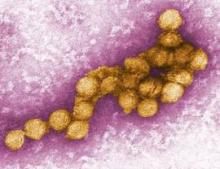The number of West Nile cases continues to increase, with 1,590 confirmed cases and 66 deaths so far, officials from the Centers for Disease Control and Prevention announced Aug. 29.
The number represents a 40% jump from the Aug. 22 case update, Dr. Lyle Petersen said during a CDC press briefing, with 629 more cases of neuroinvasive disease and an additional 21 deaths.
As of now, 48 states have reported the virus in people, birds, or mosquitoes; 43 states have reported at least one human case, said Dr. Petersen, director of the CDC Division of Vector-Borne Infectious Diseases. The case load is the highest for the first 3 weeks of August since the disease first appeared in the United States in 1999.
"We can’t accurately predict how many human cases will be reported," Dr. Petersen said. "But we think this may come close to, or exceed, the outbreaks of 2002 and 2003."
The majority of the cases (56%; 889) have been the serious, neuroinvasive disease, Dr. Petersen said.
More than 70% of the cases have occurred in South Dakota, Mississippi, Oklahoma, Louisiana, Michigan, and Texas. Texas continues to bear the brunt of the epidemic, accounting for more than 50%.
Since last week, Texas has reported an additional 197 cases, bringing that state’s total to 783, said Dr. David Lakey, commissioner of the Texas Department of State Health Services. The state now claims 416 neuroinvasive cases – an increase of 93 over last week. There have been 10 additional deaths, bringing the total count to 31. The majority of patients with neuroinvasive disease (95%) have been hospitalized, and 40% treated in intensive care units.
Those numbers are likely to increase for at least a few more weeks, Dr. Lakey said during the briefing. "As I look at the data, I am not convinced the disease has peaked."
Hardest hit has been Dallas County, with a total of 309 cases, 152 of those neuroinvasive, and 12 deaths.
Hurricane Isaac is not likely to have an effect on transmission, Dr. Petersen said. There was an uptick in West Nile after Hurricane Katrina, but data suggest that was mostly due to increased outdoor exposure due to damaged houses and the recovery efforts.
Although other states are reporting a far lower incidence, the virus is there and people are still at risk.
"This virus is endemic now throughout the entire U.S., and it circulates every year. It’s just a matter of how much. There is a risk everywhere. It may be lower in some states, but it is still not zero," Dr. Peterson said.
Currently, there are four approved West Nile vaccines for horses, but none for humans, and there probably will never be, he added. "We know we can create an effective vaccine, and in fact, there have been a few successful phase I and II trials. The problem is that we are dealing with a relatively low-incidence disease with widely dispersed cases, so it’s fairly daunting to produce a phase III trial that shows efficacy."
West Nile’s unpredictable seasonal transmission also makes it nearly impossible to get the numbers necessary for such a study. The same issue affects treatment research. "A number of treatment trials have been started, but none has been completed because of low patient enrollment."
As public health officials, neither Dr. Petersen nor Dr. Lakey have any financial disclosures.


